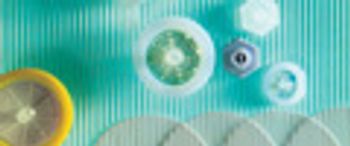
Good morning and welcome to LCGC's third and final day of conference coverage from Pittcon 2007.

Good morning and welcome to LCGC's third and final day of conference coverage from Pittcon 2007.

Well-known LCGC Columnists John Dolan and John Hinshaw provide their list of recommended sessions.

Good morning, fellow Pittcon conferees, and welcome to Day 2 of LCGC North America's ongoing coverage from Pittcon 2007.

Chromatography Forum of Delaware Valley Dal Nogare Award Dr. John W. Dolan was the proud recipient of the Dal Nogare Award at Pittcon 2007, adding another bright note to his illustrious career.

The 2007 Ralph N. Adams Award in Bioanalytical Chemistry was presented to Norman J. Dovichi, Professor of Chemistry at the University of Washington, on Monday afternoon at Pittcon 2007.

Attendees continue to trickle in, as snowstorms around the country continue to disrupt air travel. For those like me who thought, "Chicago in February? Hooray!"

Yesterday, Andrew Tiplerwas going nowhere fast because of airport delays. Today, he was discussing how to accelerate your gas chromatography runs.

Shana Kelley received the Pittsburgh Conference Achievement Award in a ceremony on Monday morning of Pittcon 2007.

Eight presentations on a variety of LC-MS applications were given in Session 170 on this first afternoon at Pittcon. One of the most interesting was session 170-6, "Techniques of LC-MS in Forensics Analysis." The speaker, Michael C. Zumwalt, discussed the variety of LC-MS instrumentation available to meet both qualitative and quantitative needs. Among the interesting applications he discussed were those for detecting drugs of abuse and explosives. Workplace drug testing and forensic toxicology are examples of these applications. LC-MS continues to be a rapidly growing technique, and the ways in which it can be used in forensic analysis are quite varied. Serial measurement systems are used for quantitation, while parallel systems are best for qualitative applications. Serial systems such as single quadrupole and triple quadrupole mass spectrometers are very useful for detecting drugs of abuse in oral fluids. A particular advantage noted by the speaker is the ease of sample collection, which can even be done in the field, for example, by a police officer.

Well-known LCGC Columnists John Dolan and John Hinshaw provide their list of recommended sessions.

Most arrived at Pittcon 2007 wet, cold, and frustrated. But a the blizzard whooping around Chicago couldn't bring David Schwartz down today when he was presented with the 2007 Pittcon Heritage Award.

As most of us traveled by air to Chicago this weekend, we all passed through airport security and the various drills like taking off our shoes, removing metal objects and taking the all-important laptop out of its case.

Sunday afternoon's plenary lecture at Pittcon 2007 was given by Charles M. Lieber and was titled "Nanowire Nanoelectric Devices for Detection of and Interfacing to Biological Systems."

Pittcon 2007 opened with a bang here in Chicago, albeit a snowy bang. All the liquid falling outside, whether in rain, snow, or ice form, was nothing compared to the liquid chromatography sessions.

Good morning, and welcome to the opening day of LCGC's "Meeting Report" from Pittcon 2007 in Chicago, Illinois.

Separation instrument techniques are among the most widely used technologies in the analytical instrumentation market. It spans the entire industrial and regional marketplace. The lab separations market includes chromatographic techniques like analytical and preparative HPLC, GC, IC, TLC, flash, and low pressure LC.

Each month in our Technology Forum we will feature a discussion between industry experts on various trends and issues in the chromatography field. This month's Technology Forum looks at the topic of Pittcon 2007 and the trends and issues surrounding it. Joining us for this discussion are Tom Ricci with Ricci Communications and LCGC Columnists John Dolan and John Hinshaw.

According to "Column Watch" Editor Ron Majors, Type C silica is a term introduced by Dr. Joseph Pesek of San Jose State University (California).

This installment of "Sample Prep Perspectives" discusses techniques for the reduction/depletion of high-abundance proteins.

Traditional methods for the sample preparation of insoluble solid materials have represented one of the more time consuming and labour-intensive efforts in analysis. In this instalment of "Sample Prep Perspectives", Ron Majors examines modern sample preparation methods for solids that often involve increased temperature and higher pressure to speed up the extraction process. In addition, modern sample preparation methods have been automated to relieve analysts of the drudgery associated with traditional methods. Here, he reports on automated Soxhlet extraction, supercritical fluid extraction, pressurized fluid extraction–accelerated solvent extraction, and microwave-assisted extraction and updates earlier coverage.

Through the years, Pittcon has provided a platform for leading researchers to present new breakthroughs in their scientific endeavors.

Beginning in February, Steve Brown, LCGC technical editor of 18 years, will answer your technical questions. Each month, one question will be selected to appear in this space, so we welcome your submissions. Please send all questions to the attention of "Ask the Editor" at lcgcedit@lcgcmag.com. We look forward to hearing from you.

Although the majority of solid-phase extraction (SPE) is performed with conventional bonded silica- and polymeric-phases, difficult and complex samples may require more specialized stationary phases. In this installment of "Sample Prep Perspectives," columnist Ron Majors discusses advanced topics such as multimodal SPE, restricted-access media, molecular imprinted polymers, immunoaffinity extraction phases, and other class- or compound-specific sorbents. These phases provide additional selectivity, and procedures using them can be automated. Representative applications will be presented.

The environmental market peaked about fifteen years ago when the United States government passed a large body of new environmental laws and strengthened existing ones, dramatically increasing the number of mandated tests. As a result, the analytical instruments market received a boost in new instrument sales. While growth from the environmental market has slowed considerably since, the total market is still quite significant.

Since the first Pittsburgh Conference on Analytical Chemistry and Applied Spectroscopy was held in 1950, Pittcon, as it is called today, has become a key meeting place where renowned scientists present their pioneering research and developers showcase the latest instruments that make many of those research scientific breakthroughs possible. This two-part article series will present a historical perspective on just a few of the significant scientific advancements that were discussed and demonstrated at Pittcon over the years. Part I will focus on new instruments and techniques that were presented at Pittcon from 1950 to 1980, and Part II will discuss a few of the many notable scientists and their discoveries that have been enabled by advances in mass spectrometry, capillary electrophoresis, and other instrumental techniques since 1980.